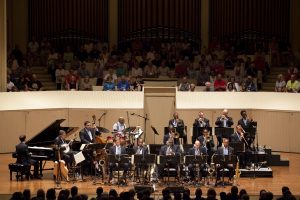
Just 300 miles from Chautauqua, New York City is growing and changing. Tonight, two orchestras will bring the city to the Amphitheater.
In its last concert of the year, the Chautauqua Symphony Orchestra will be joined by jazz composer Wynton Marsalis, the Jazz at Lincoln Center Orchestra and guest conductor Cristian Măcelaru to perform “The Jungle” — an intense, wary exploration of New York City, at 8:15 p.m. Tuesday, August 20 in the Amp.
“The Jungle” premiered in late 2016 with the New York Philharmonic, and has since seen only a handful of performances. Tonight, the piece will be performed in full for the first time in 2019.
Marsalis is a New Orleans-born composer and conductor. He is the winner of nine Grammy awards, and is the only musician in history to receive both jazz and classical Grammy Awards in the same year — which he accomplished twice.
For Marsalis, New York City is a place like no other — a huge, shifting, high-pressure city.
“New York City is the most fluid, pressure-packed and cosmopolitan metropolis the modern world has ever seen,” Marsalis wrote in his notes for the original program.
The city of almost 9 million is a hub for culture, trade and information of all sorts. Marsalis wrote that its social connections pass along ideas at lightning speed.
“The dense mosaic of all kinds of people everywhere doing all kinds of things encourages you to ‘stay in your lane,’ but the speed, freedom and intensity of our relationships to each other — and to the city itself — forces us onto a collective superhighway unlike any other in our country,” Marsalis wrote.
And any superhighway can be dangerous. Marsalis wrote that “The Jungle” is darker than some of his previous compositions, drawing from inequality and violence in the city — ills that could stunt an evolving society.
“It considers the possibility that we may not be up to overcoming the challenges of social and racial inequality, tribal prejudices, and endemic corruption,” Marsalis wrote. “We may choose to perish in a survival-of-the-fittest, asphalt-jungle-style battle for what is perceived as increasingly scarce resources, instead of coming together to create unlimited assets and to enjoy the cultural ascendancy that our form of democracy makes conceivable.”
“The Jungle” is Marsalis’ fourth symphony. Like some of his previous compositions, it features what he describes as “blues-tinged melodies,” “jazz and fiddle improvisations” and a variety of different musical styles and forms.
Like Marsalis’ metropolitan muse, “The Jungle” is a mosaic of different characteristics: various styles of blues and swing fused with the classical symphony. For New York Times reviewer Anthony Tommasini, Marsalis managed to “for the most part (find) the sweet spot.”
“The vernacular elements sounded freshest when Mr. Marsalis folded them into passages of symphonic mass, with thick, pungent chords and boldly fractured phrases,” Tommasini wrote. “Reflective passages full of poignant melodic turns and blues-tinged, plushly orchestrated harmonies alternate with vibrantly jazzy, fidgety episodes.”
Măcelaru will return to Chautauqua to conduct “The Jungle.” He said the piece is exciting on multiple levels, from its technical elements to emotional sound.
“In (‘The Jungle’), I find a world of contributing voices that together form a unique tapestry of sounds, emotions, feelings,” Măcelaru said. “I am looking forward to immersing myself again in this vast world of musical gestures that span centuries of musical forms, from fugues to shuffles, and passacaglia lines to the blues. It is truly a remarkable work of art, not just in its technical aspect, but also on a deep emotional level, a spiritual journey of sorts.”
Măcelaru is the music director and conductor of the Cabrillo Festival of Contemporary Music. For him, contemporary compositions like “The Jungle” are built from the same timeless motivations as their classical counterparts.
“I conduct Marsalis for the same reason I conduct Alban Berg and Beethoven: I am interested in their narrative,” Măcelaru said. “Music is simply the language we use to communicate these deep, unique emotions, which cannot be expressed in words. To limit ourselves in experiencing every voice is to deny our most basic human desire — connecting with each other.”
Marsalis is the music director and conductor of the Jazz at Lincoln Center Orchestra. Chris Crenshaw, a trombonist with the Jazz at Lincoln Center Orchestra, says performances of “The Jungle” change with every orchestra.
“We’ve performed it with other orchestras around the world, and it’s different every time,” Crenshaw said. “Every orchestra we’ve performed it with has their own approach — their own take. We’re looking forward to performing it with (the CSO) and hearing their interpretation, and for them to hear our interpretation.”




